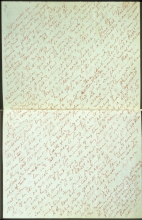Page 1 & 2
Before another line passes between us we must come to an agreement, my impulsive friend. You will have first to promise me faithfully never to judge of either of us, nor of the situation, nor of anything else bearing any relation to the "mythical Brothers" — tall or short — thick or thin — by your worldly experience or you will never come at the truth. By doing so until now you have only disturbed the solemn quiet of my evening meals several nights running and made my snake-like signature what with your writing it and thinking about it to haunt me even in my sleep — as by sympathy I felt it being pulled by the tail at the other side of the hills. Why will you be so impatient? You have a life time before you for our correspondence; though while the dark clouds of the Deva-Lok "Eclectic" are lowering on the horizon of the "Parent" it has to be a spasmodic and an uncertain one. It may even suddenly break off owing to the tension given it by our too intellectual friend. Oy-hai, Ram Ram! To think that our very mild criticism upon the pamphlet, a criticism reported by you to Hume Sahib — should have brought the latter to kill us at a blow! to destroy, without giving us one moment to call a Padri in or even time to repent; to find ourselves alive, and yet so cruelly deprived of our existence is truly sad, tho' not quite unexpected. But it is all our own fault. Had we — instead prudently sent a laudatory hymn to his address we might now have been alive and well, waxing in health and strength — if not in wisdom — for long years to come and finding in him our Ved-Vyasa to sing the occult prowess of the Krishna and Arjuna on the desolate shores of Tsam-po. Now that we are dead and dessicated tho', I may as well occupy a few minutes of my time to write as a bhut to you, in the best English I find lying idle in my friend's brain; where also I find in the cells of memory the phosphorescent thought of a short letter to be sent by himself to the Editor of the Pioneer to soothe his English impatience. My friend's friend — K.H. has not forgotten you; K.H. does not intend breaking off with you — unless Hume Sahib should spoil the situation beyond mending. And why should he? You have done all you could, and that is as much as we ever intend asking of any one. And now we will talk.
You must thoroughly put aside the personal element if you would get on with occult study and — for a certain time — even with himself. Realize, my friend, that the



Bhut or Bhūta is a Sanskrit word for the ghost of a deceased person.
Sahib means "friend" in Arabic and was commonly used in the Indian Sub-continent as a courteous term in the way that "Mr." and "Mrs." are used in the English language.
Tsam-po refers to the Yarlung Tsangpo river, which is the upper stream of the Brahmaputra. It runs through "desolate shores" in Tibet near Shigatse, where the Masters lived.